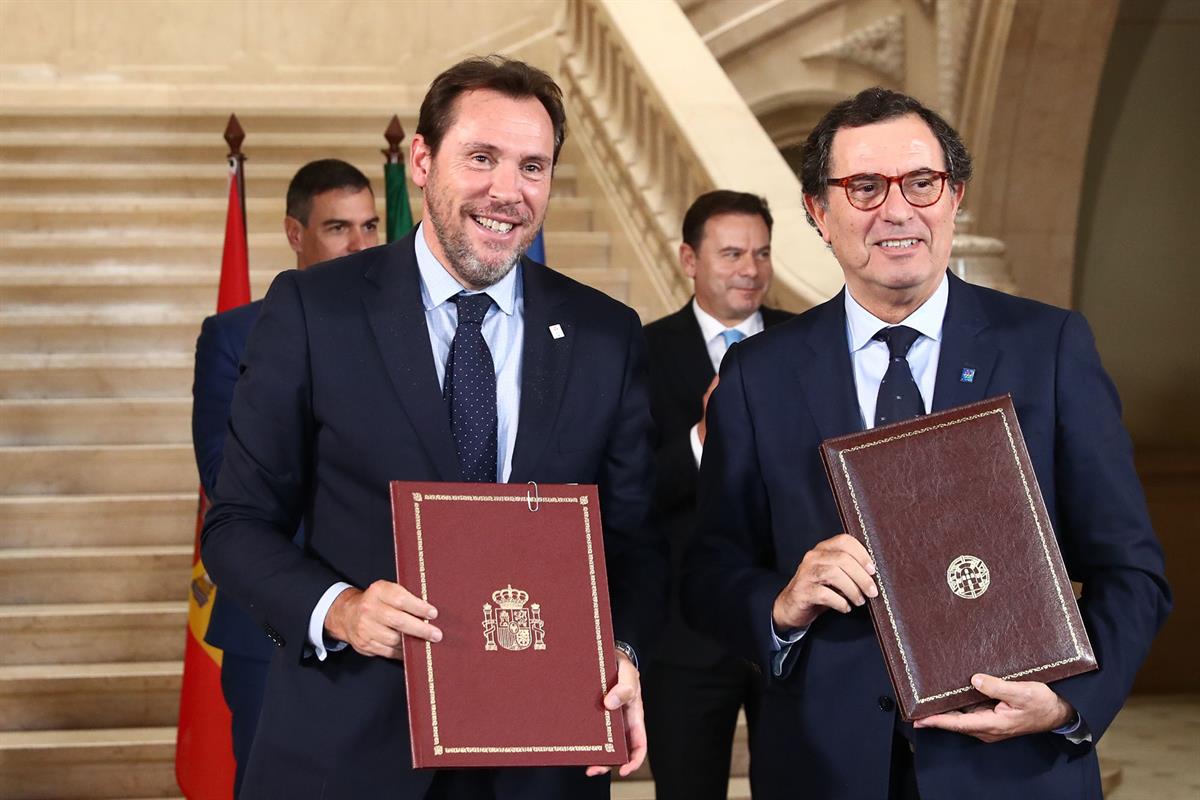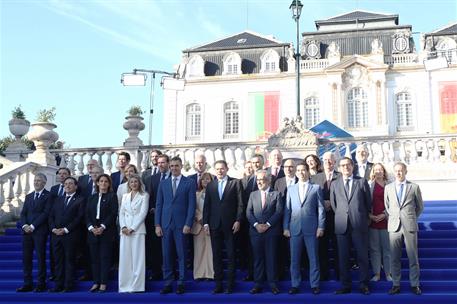Thirty-fifth Portuguese-Spanish Summit in Faro
During the Summit with Portugal, Spain commits to promote the high-speed rail link between Madrid and Lisbon by 2030
News - 2024.10.23
 The Minister for Transport and Sustainable Mobility, Óscar Puente, and his Portuguese counterpart after the signing of the bilateral agreements (Pool Moncloa/Fernando Calvo)
The Minister for Transport and Sustainable Mobility, Óscar Puente, and his Portuguese counterpart after the signing of the bilateral agreements (Pool Moncloa/Fernando Calvo)
During the summit, the minister held a meeting with the Portuguese Minister for Infrastructure and Housing, Miguel Pinto Luz, to discuss the future of the Atlantic Corridor and cross-border connections to promote European cohesion and the development of sustainable and efficient international transport.
In this context, both ministers expressed their support for the development of the Trans-European Transport Network and agreed to give a definitive boost to the construction of the line by signing the Commission's implementing decision on the Lisbon-Madrid high-speed cross-border rail link in the Atlantic Core Network Corridor as soon as possible. Thus, a temporary planning of the actions on the axis will be established for its commissioning within the time horizon defined in the new Trans-European Network regulation.
As both countries have acknowledged, the future railway connection will provide a fast, comfortable and sustainable transport offering between the capitals of both countries.
"Both countries have made great progress in the materialisation of the Atlantic Corridor rail infrastructure on the Peninsula", said the minister, during his speech at the plenary session of the Summit, after the meeting with his Portuguese counterpart.
On this point, in the Summit Conclusions document, Spain and Portugal highlighted the great progress made in the construction of cross-border road and rail connections and undertook to continue promoting them, with an emphasis on those included in the Atlantic Corridor, such as the actions committed to in each country for the connections between Oporto and Vigo, Aveiro and Salamanca, as well as, at the agreed time, the mobility flow studies and cost-benefit analysis for the Faro-Huelva rail connection, among others.
Connecting with Europe
The Minister for Transport and Sustainable Mobility took advantage of his speech at the Summit Plenary to recall the importance of cross-border connections throughout Europe, especially on the border between Spain and France, in order to articulate a single European railway area and to ensure that the heavy investments made on the Peninsula bear fruit.
"Our president and prime minister have signed a new communication to the French prime minister urging him to speed up his actions on the new cross-border rail infrastructure of the Atlantic and Mediterranean Corridors. This is essential in order to make the most of our important investments, to be able to absorb the increased traffic that will result from the actions that Portugal and Spain have carried out and are going to carry out, and to contribute to the European Union's decarbonisation objectives", said Óscar Puente.
At this point, the minister and his Portuguese counterpart agreed to write a letter to the same effect, and to inform the new minister in charge of Transport in France, the new Commissioner for Sustainable Transport and Tourism when they are appointed, the chair of the TRANS Committee of the Parliament, and the Directorate-General for Mobility and Transport of the European Commission of the letter from President Pedro Sánchez and Prime Minister Luís Montenegro.
These letters will be a continuation of the one sent in April to request a boost for the new railway infrastructure of the sections of the Atlantic and Mediterranean Corridors closest to the Pyrenees.
Bilateral issues
Óscar Puente and his Portuguese counterpart reviewed all bilateral issues and agreed to move forwards on new actions.
- Maritime transport: they addressed the possible negative consequences of the implementation of the EU Emissions Trading Scheme (ETS) and committed to working together to establish an ambitious scheme at the level of the International Maritime Organisation.
- Road infrastructure: they reviewed the very intensive activity in the field of road links. At this point, it is worth mentioning the two International Agreements signed today with the Portuguese Deputy Minister for Territorial Cohesion to build a new bridge between the towns of Nisa and Cedillo and another between Alcoutim and Sanlúcar de Guadiana, which will subsequently be developed through agreements between the Ministry and the competent Administrations. It is also worth mentioning the progress made in the actions agreed on the different connections, such as the rehabilitation and improvement of the bridge between Monçao (Portugal) and Salvaterra do Miño (Spain) or the improvement of road safety on the crossings of the N-122 .
- Railway: There have been numerous developments and commitments on rail transport. With regard to the Lisbon-Porto-Vigo-A Coruña connection, both ministers welcomed the fact that, in compliance with the agreements adopted, the Spain-Portugal High Speed European Economic Interest Grouping (AEIE AVEP) put the contract for updating mobility flows, the functional study and the cost-benefit analysis of the Vigo-Porto corridor out to tender in June.
For his part, the minister indicated that, apart from the complete high-speed section between A Coruña and Vigo being in service, the informative study of the southern exit of Vigo is already being drafted.
Other examples were the progress in the electrification works, installation of communications and adaptation of the gauge (seven overpasses) on the connection between Salamanca and Fuentes de Oñoro.
Non official translation





